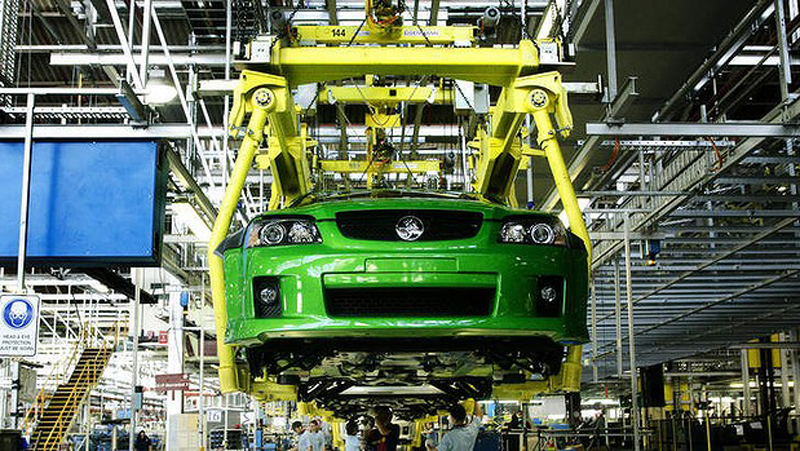Sixty-five years after it first began producing cars in Australia Holden has confirmed it will cease local manufacturing in 2017.
Holden released a statement saying it would “transition to a national sales company in Australia and New Zealand” from 2017, citing the strong Australian dollar, high production costs and the competitive local market for the decision.
“This has been a difficult decision given Holden’s long and proud history of building vehicles in Australia,” said Holden chairman and managing director Mike Devereux. “We are dedicated to working with our teams, unions and the local communities, along with the federal and state governments, to support our people.”
“We are completely dedicated to strengthening our global operations while meeting the needs of our customers,” said GM Chairman and CEO Dan Akerson. “The decision to end manufacturing in Australia reflects the perfect storm of negative influences the automotive industry faces in the country, including the sustained strength of the Australian dollar, high cost of production, small domestic market and arguably the most competitive and fragmented auto market in the world.”
Acting Prime Minister Warren Truss confirmed he had spoken with Holden’s Australian boss Mike Devereux about 10 minutes before Question Time, when he informed Mr Truss that the decision had been taken at the company’s headquarters in Detroit.
Amid booing from Labor MPs, who blame Holden’s departure on the coalition’s refusal to give more government funding to the carmarket, Mr Truss told Parliament that “like all members in the house, we regret the fact that GM is to phase down its operations in this country.”
“Holden has been an iconic… brand for Australians, a part of our heritage,” said Mr Truss, who is standing in for Tony Abbott who has been in South Africa for Nelson Mandela’s memorial.
“It’s meant a great deal to Australians over several generations,” Mr Truss said. “Many of us have had the pleasure of travelling and owning Australian-built Holdens and it is a pity that that will not continue into the future.
“Now this government had indicated right from the very beginning that we wanted Holden to remain manufacturing cars in Australia. “We’ve wanted,” he continued, over loud jeers, “we want to have a strong and active motor vehicle manufacturing industry in Australia.”
In a press release explaining the decision, General Motors chairman Dan Akerson said the decision to end manufacturing in Australia “reflects the perfect storm of negative influences the automotive industry faces in the country”.
Mr Akerson blamed the high Australian dollar, high cost of production, small domestic market and “arguably the most competitive and fragments auto market in the world”.
The move ends weeks of intense speculation and years of uncertainty surrounding the General Motors’-owned brand’s Adelaide production line and Victorian engine plant from the company that was formed in 1856 and first started manufacturing cars locally in 1948.
The announcement will send shockwaves through the struggling automotive industry, which has warned of upwards of 50,000 job losses.
About 2900 Australian jobs will be “impacted” over the next four years as a result of General Motors’ decision, the company said in a statement. This will comprise 1600 jobs from the Elizabeth vehicle manufacturing plant and about 1300 from Holden’s Victorian workforce.
“Holden will continue to have a significant presence in Australia beyond 2017, comprising a national sales company, a national parts distribution centre and a global design studio,” the statement says.
Holden managing director Mike Devereux said an important priority over the next four years would be to ensure the “best possible transition” for workers in South Australia and Victoria.
“This has been a difficult decision given Holden’s long and proud history of building vehicles in Australia,” Mr Devereux said.
The sale and service of Holden vehicles will be “unaffected” by the announcement, the statement says. Warranty terms and spare parts availability will remain unchanged.
Hundreds of workers began streaming out of Holden’s Elizabeth plant after receiving the news shortly before the close of its day shift.
“Ive been waiting for a package anyway” said Rob Williams, who worked on the door production line for 19 years. Others were angry and shouted and honked as they left.
The Holden announcement is also almost certain to force Toyota to follow suit, which relies heavily on the 160-odd component makers that rely on economies of scale to maintain competitive prices.
But the determination of the recently-elected Tony Abbott-led Liberal government to cut vital funding to the industry also contributed.
2013 will go down as a dark year for the local automotive industry, with Ford confirming earlier in the year it would cease vehicle manufacturing by 2016.
For almost two years the local manufacturers have been pitching its case for additional funding, pointing to overseas funding models that deliver generous incentives for automotive manufacturing plants.







